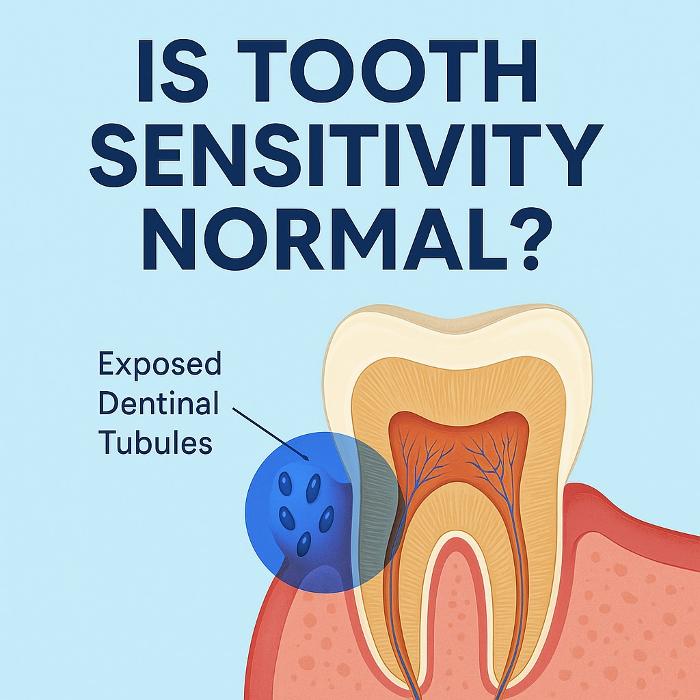
That twinge when drinking cold water? It may be common, but it’s not normal.
If you’ve ever winced while sipping something icy or brushing your teeth, you’re not alone. Persistent sensitivity could be a sign of a deeper issue.
What Is Tooth Sensitivity?
Tooth sensitivity, or dentinal hypersensitivity, happens when the inner layer of your tooth—called dentine—becomes exposed. This layer contains tiny channels (dentinal tubules) that lead directly to the nerve. When exposed, triggers like cold, sweet, or acidic food and drink can reach the nerve and cause sharp, sudden discomfort.

Common Causes of Sensitive Teeth
Tooth sensitivity may be caused by:
- Tooth wear from grinding, acidic diets, or brushing too hard
- Gum recession, often from gum disease or overbrushing
- Cracks, cavities or worn fillings
- Recent dental treatments such as cleans, fillings, or whitening
- Excessive use of mouthwash or over-the-counter whitening products
Even routine cleans can expose sensitive spots by removing plaque that was acting as a shield. Ongoing pain isn’t normal—it could be a sign that something is wrong.
Should Cold Water Hurt? Absolutely Not.
Your teeth shouldn’t react painfully to cold drinks or gentle brushing. Persistent sensitivity could point to:
- Tooth decay
- Microfractures
- Worn or leaking fillings
- Inflammation of the tooth nerve (which may lead to root canal treatment)
How Do We Treat It?
1. Relieve the Symptoms
- Desensitising toothpaste (e.g., with potassium nitrate or stannous fluoride) can block nerve signals or seal the dentinal tubules. Here are our tips to use it:
- Don’t rinse after brushing.
- Stick with it for at least 2–4 weeks.
- If one doesn’t work, try another formulation.
In-clinic fluoride varnishes or sealants offer extra protection to exposed root surfaces.
These methods can ease discomfort but are not long-term solutions.
2. Treat the Cause
- We focus on addressing the root issue:
- Treat decay, cracked fillings or structural problems
- Correct gum recession (sometimes using grafts or laser therapy)
- Protect teeth from grinding with a custom nightguard
- Rebuild worn enamel with conservative restorations
3. Advanced Laser Therapy
- Advanced technology is changing the way we treat sensitivity with clinical research supporting the effectiveness of laser treatments for tooth sensitivity (Fekrazad et al., 2011).
Treatments include:
- Photobiomodulation (PBM): Low-level laser light that reduces inflammation and supports nerve healing
- Er:YAG Laser (Fotona): Gently seals dentinal tubules to reduce discomfort and prevent further exposure
Bottom Line: Sensitivity Is a Sign, Not a Diagnosis
If you’ve been using sensitive toothpaste with no relief, it may be time for a professional dental assessment. Prolonged sensitivity can lead to more serious issues if left untreated.
At Mentone Family Dentist, we take a holistic, technology-led approach to uncovering and treating the cause. Whether it's dental erosion, gum issues, or something else, we’re here to help.
Book a free consultation with our dental team to find out what’s behind your sensitivity and potential treatment options.
